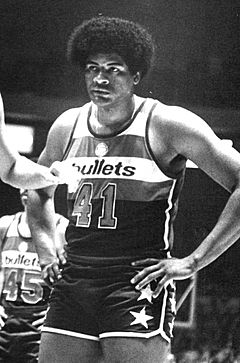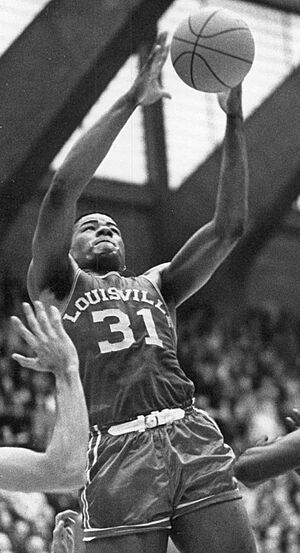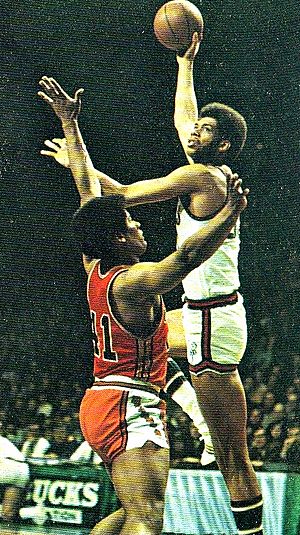Wes Unseld facts for kids

Unseld with the Washington Bullets in 1975
|
|||||||||||||||||
| Personal information | |||||||||||||||||
|---|---|---|---|---|---|---|---|---|---|---|---|---|---|---|---|---|---|
| Born | March 14, 1946 Louisville, Kentucky, U.S. |
||||||||||||||||
| Died | June 2, 2020 (aged 74) Catonsville, Maryland, U.S. |
||||||||||||||||
| High school | Seneca (Louisville, Kentucky) | ||||||||||||||||
| Listed height | 6 ft 7 in (2.01 m) | ||||||||||||||||
| Listed weight | 245 lb (111 kg) | ||||||||||||||||
| Career information | |||||||||||||||||
| College | Louisville (1965–1968) | ||||||||||||||||
| NBA Draft | 1968 / Round: 1 / Pick: 2nd overall | ||||||||||||||||
| Selected by the Baltimore Bullets | |||||||||||||||||
| Pro career | 1968–1981 | ||||||||||||||||
| Coaching career | 1987–1994 | ||||||||||||||||
| Career history | |||||||||||||||||
| As player: | |||||||||||||||||
| 1968–1981 | Baltimore / Capital / Washington Bullets | ||||||||||||||||
| As coach: | |||||||||||||||||
| 1987–1988 | Washington Bullets (assistant) | ||||||||||||||||
| 1988–1994 | Washington Bullets | ||||||||||||||||
| Career highlights and awards | |||||||||||||||||
|
|||||||||||||||||
| Career NBA statistics | |||||||||||||||||
| Points | 10,624 (10.8 ppg) | ||||||||||||||||
| Rebounds | 13,769 (14.0 rpg) | ||||||||||||||||
| Assists | 3,822 (3.9 apg) | ||||||||||||||||
|
Medals
|
|||||||||||||||||
Westley Sissel Unseld Sr. (March 14, 1946 – June 2, 2020) was an American professional basketball player, coach, and manager. He spent his entire career in the National Basketball Association (NBA) with the Baltimore/Capital/Washington Bullets.
Unseld played college basketball for the Louisville Cardinals. He was picked second overall by the Bullets in the 1968 NBA draft. In his first year, he was named the NBA Most Valuable Player and NBA Rookie of the Year. He and Wilt Chamberlain are the only two players in NBA history to win both awards in their rookie season.
Wes Unseld won an NBA championship with the Bullets in 1978. He also won the Finals MVP award that year. After he stopped playing in 1981, he worked for the Bullets/Wizards as a vice president, head coach, and general manager. He was added to the Naismith Memorial Basketball Hall of Fame in 1988. His son, Wes Unseld Jr., is also a basketball coach.
Contents
Early Life and High School Basketball
Wes Unseld was born in Louisville, Kentucky. He was one of nine children. His father, Charles, was a boxer, construction worker, and played baseball for the Indianapolis Clowns.
Unseld was a star player for the Seneca High School team. They won Kentucky state championships in 1963 and 1964. Over 100 colleges wanted him to play for them. He was the first African-American athlete to be offered a scholarship to the University of Kentucky. However, Unseld chose to stay in Louisville and attend the University of Louisville, which allowed students of all races.
College Basketball Career

Unseld played center for Louisville's freshman team. He averaged 35.8 points and 23.6 rebounds in 14 games. He played for the main Louisville team from 1965 to 1968. In 82 games, he scored 1,686 points (20.6 average) and grabbed 1,551 rebounds (18.9 average). He was the top rebounder in the Missouri Valley Conference for all three years.
Unseld was named an NCAA All-American in 1967 and 1968. He helped Louisville get a 60–22 record during his college years. They played in the National Invitation Tournament (NIT) in 1966 and the NCAA tournament in 1967 and 1968.
Professional Basketball Career
The Baltimore Bullets picked Unseld as the second player overall in the 1968 NBA draft. His hometown team, the Kentucky Colonels, also picked him in the ABA draft. Unseld chose to sign with the Bullets in the NBA.
In his very first NBA game, Unseld scored 8 points and grabbed 22 rebounds. This helped Baltimore win against the Detroit Pistons. On November 22, he had 20 points and a career-high 29 rebounds against the Philadelphia 76ers.
As a rookie, Unseld helped the Bullets turn things around. The year before, they were in last place. With Unseld, they won 57 games and became division champions. Unseld averaged 18.2 rebounds per game that year. He became only the second player ever, after Wilt Chamberlain, to win both the Rookie of the Year Award and the Most Valuable Player Award in the same season. He was also named to the NBA All-Rookie First Team.
Unseld was known as one of the best defensive players of his time. In 1974, he led the NBA in rebounding. The next season, he led the NBA in field goal percentage, making 56.1% of his shots.
Unseld was a key player for the Bullets. He played with stars like Earl Monroe, Gus Johnson, Elvin Hayes, and Bob Dandridge. The Bullets reached the NBA Finals four times between 1971 and 1979. In 1978, they won the championship against the Seattle SuperSonics. Unseld was named the Finals MVP for his amazing performance. He stopped playing in March 1981. Soon after, his No. 41 jersey was retired by the Bullets.
Player Style and Achievements
Wes Unseld was famous for his strong rebounding and tough screens. He was also great at starting fast breaks with his quick, accurate passes. Even though he wasn't the tallest center, he made up for it with his strength and determination.
In 984 NBA games, all with the Bullets, Unseld averaged a double-double in points and rebounds. He averaged 10.8 points and 14.0 rebounds per game. He also averaged 3.9 assists, which was excellent for a center.
Unseld was inducted into the Naismith Memorial Basketball Hall of Fame in 1988. In 1996, he was named one of the NBA's 50 Greatest Players of all time. In 2021, he was also named to the NBA 75th Anniversary Team.
Life After Playing: Coach and Manager
After Unseld retired from playing in 1981, he joined the Bullets' front office. He worked as a vice president for six years. In 1988, he became the team's head coach. He coached until 1994, with a record of 202 wins and 345 losses.
In 1996, Unseld became the Bullets' general manager. The team was renamed the Wizards in 1997. He stayed in that role for seven years. During his time as general manager, he led the team to the playoffs once.
Personal Life
Wes Unseld's wife, Connie, started Unselds School in 1979. It is a coed private school in Baltimore. It offers a daycare program, nursery school, and classes from kindergarten to eighth grade. Connie and their daughter Kimberly work as teachers at the school. Wes Unseld worked there as an office manager and head basketball coach.
He was the godfather of NBA player Kevin Love. Kevin's father, Stan Love, was Unseld's teammate on the Baltimore Bullets. Wes Unseld's son, Wes Unseld Jr., is also a coach in the NBA. He became the head coach of the Wizards in 2021.
Death
Wes Unseld passed away on June 2, 2020. He had been dealing with health issues for a long time.
NBA Career Statistics
Playing Statistics
| Legend | |||||
|---|---|---|---|---|---|
| GP | Games played | GS | Games started | MPG | Minutes per game |
| FG% | Field goal percentage | 3P% | 3-point field goal percentage | FT% | Free throw percentage |
| RPG | Rebounds per game | APG | Assists per game | SPG | Steals per game |
| BPG | Blocks per game | PPG | Points per game | Bold | Career high |
Source:
NBA regular season playing statistics
| Year | Team | GP | GS | MPG | FG% | 3P% | FT% | RPG | APG | SPG | BPG | PPG |
|---|---|---|---|---|---|---|---|---|---|---|---|---|
| 1968–69 | Baltimore | 82 | — | 36.2 | .476 | — | .605 | 18.2 | 2.6 | — | — | 13.8 |
| 1969–70 | Baltimore | 82* | — | 39.4 | .518 | — | .638 | 16.7 | 3.5 | — | — | 16.2 |
| 1970–71 | Baltimore | 74 | — | 39.2 | .501 | — | .657 | 16.9 | 4.0 | — | — | 14.1 |
| 1971–72 | Baltimore | 76 | — | 41.7 | .498 | — | .629 | 17.6 | 3.7 | — | — | 13.0 |
| 1972–73 | Baltimore | 79 | — | 39.1 | .493 | — | .703 | 15.9 | 4.4 | — | — | 12.5 |
| 1973–74 | Capital | 56 | — | 30.8 | .438 | — | .655 | 9.2 | 2.8 | 1.0 | .3 | 5.9 |
| 1974–75 | Washington | 73 | — | 39.8 | .502 | — | .685 | 14.8* | 4.1 | 1.6 | .9 | 9.2 |
| 1975–76 | Washington | 78 | — | 37.5 | .561* | — | .585 | 13.3 | 5.2 | 1.1 | .8 | 9.6 |
| 1976–77 | Washington | 82 | — | 34.9 | .490 | — | .602 | 10.7 | 4.4 | 1.1 | .5 | 7.8 |
| 1977–78† | Washington | 80 | — | 33.1 | .523 | — | .538 | 11.9 | 4.1 | 1.2 | .6 | 7.6 |
| 1978–79 | Washington | 77 | — | 31.2 | .577 | — | .643 | 10.8 | 4.1 | .9 | .5 | 10.9 |
| 1979–80 | Washington | 82 | — | 36.3 | .513 | .500 | .665 | 13.3 | 4.5 | .8 | .7 | 9.7 |
| 1980–81 | Washington | 63 | — | 32.3 | .524 | .500 | .640 | 10.7 | 2.7 | .8 | .6 | 8.0 |
| Career | 984 | — | 36.4 | .509 | .500 | .633 | 14.0 | 3.9 | 1.1 | .6 | 10.8 | |
| All-Star | 5 | 0 | 15.4 | .500 | — | .600 | 7.2 | 1.2 | .4 | .0 | 6.2 | |
NBA playoff playing statistics
| Year | Team | GP | GS | MPG | FG% | 3P% | FT% | RPG | APG | SPG | BPG | PPG |
|---|---|---|---|---|---|---|---|---|---|---|---|---|
| 1969 | Baltimore | 4 | — | 41.3 | .526 | — | .789 | 18.5 | 1.3 | — | — | 18.8 |
| 1970 | Baltimore | 7 | — | 41.3 | .414 | — | .789 | 23.6 | 3.4 | — | — | 10.4 |
| 1971 | Baltimore | 18 | — | 42.2 | .462 | — | .568 | 18.8 | 3.8 | — | — | 13.2 |
| 1972 | Baltimore | 6 | — | 44.3 | .492 | — | .526 | 12.5 | 4.2 | — | — | 12.3 |
| 1973 | Baltimore | 5 | — | 40.2 | .417 | — | .474 | 15.2 | 3.4 | — | — | 9.8 |
| 1974 | Capital | 7 | — | 42.4 | .492 | — | .600 | 12.1 | 3.9 | .6 | .1 | 10.1 |
| 1975 | Washington | 17 | — | 43.2 | .546 | — | .656 | 16.2 | 3.8 | .9 | 1.2 | 10.7 |
| 1976 | Washington | 7 | — | 44.3 | .462 | — | .542 | 12.1 | 4.0 | .9 | .6 | 7.0 |
| 1977 | Washington | 9 | — | 40.9 | .556 | — | .583 | 11.7 | 4.9 | .9 | .7 | 7.4 |
| 1978† | Washington | 18 | — | 37.6 | .530 | — | .587 | 12.0 | 4.4 | .9 | .4 | 9.4 |
| 1979 | Washington | 19 | — | 38.7 | .494 | — | .609 | 13.3 | 3.4 | .9 | .7 | 10.3 |
| 1980 | Washington | 2 | — | 43.5 | .500 | .000 | .667 | 14.0 | 3.5 | .0 | 1.5 | 9.0 |
| Career | 119 | — | 41.1 | .493 | .000 | .608 | 14.9 | 3.8 | .8 | .7 | 10.6 | |
Coaching Statistics
| Regular season | G | Games coached | W | Games won | L | Games lost | W–L % | Win–loss % |
| Playoffs | PG | Playoff games | PW | Playoff wins | PL | Playoff losses | PW–L % | Playoff win–loss % |
| Team | Year | G | W | L | W–L% | Finish | PG | PW | PL | PW–L% | Result |
|---|---|---|---|---|---|---|---|---|---|---|---|
| Washington | 1987–88 | 55 | 30 | 25 | .545 | 2nd in Atlantic | 5 | 2 | 3 | .400 | Lost in first round |
| Washington | 1988–89 | 82 | 40 | 42 | .488 | 4th in Atlantic | — | — | — | — | Missed playoffs |
| Washington | 1989–90 | 82 | 31 | 51 | .378 | 4th in Atlantic | — | — | — | — | Missed playoffs |
| Washington | 1990–91 | 82 | 30 | 52 | .366 | 4th in Atlantic | — | — | — | — | Missed playoffs |
| Washington | 1991–92 | 82 | 25 | 57 | .305 | 6th in Atlantic | — | — | — | — | Missed playoffs |
| Washington | 1992–93 | 82 | 22 | 60 | .268 | 7th in Atlantic | — | — | — | — | Missed playoffs |
| Washington | 1993–94 | 82 | 24 | 58 | .293 | 7th in Atlantic | — | — | — | — | Missed playoffs |
| Career | 547 | 202 | 345 | .369 | 5 | 2 | 3 | .400 | |||
See also
 In Spanish: Wes Unseld para niños
In Spanish: Wes Unseld para niños
- List of National Basketball Association career rebounding leaders
- List of National Basketball Association career playoff rebounding leaders
- List of National Basketball Association annual rebounding leaders
- List of National Basketball Association players with most rebounds in a game
- List of NCAA Division I men's basketball career rebounding leaders
- List of people from the Louisville metropolitan area
- List of University of Louisville people
 | Claudette Colvin |
 | Myrlie Evers-Williams |
 | Alberta Odell Jones |


